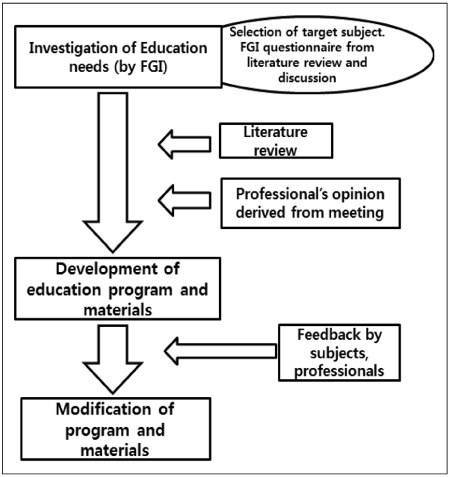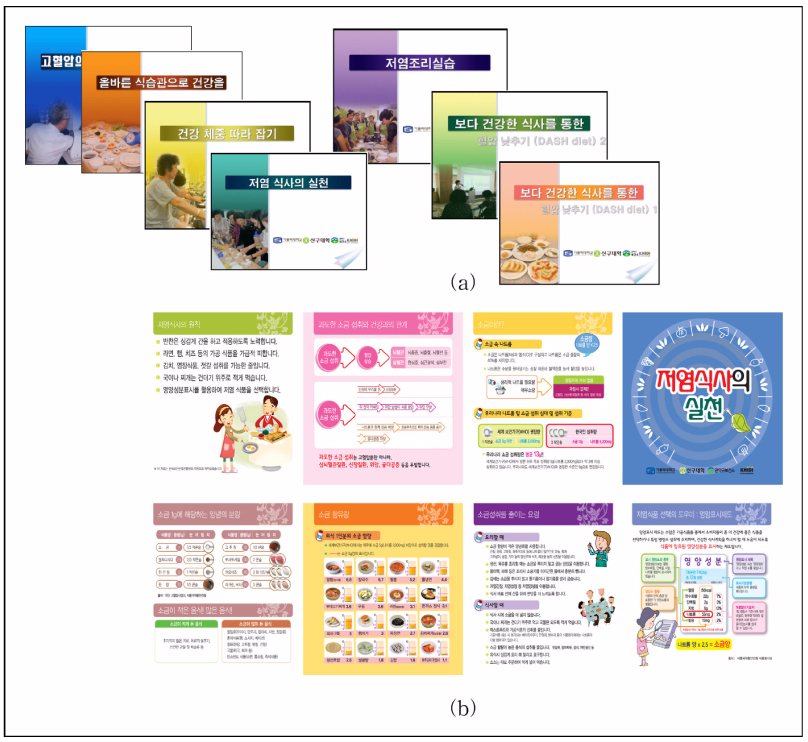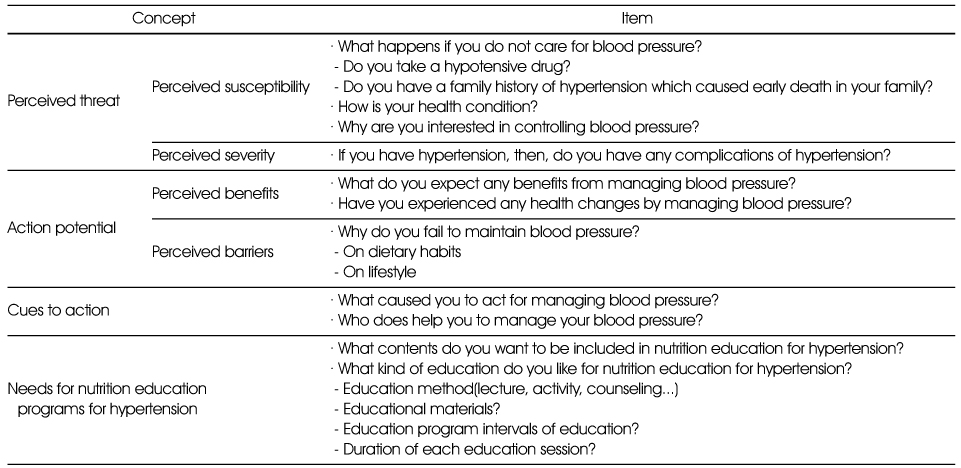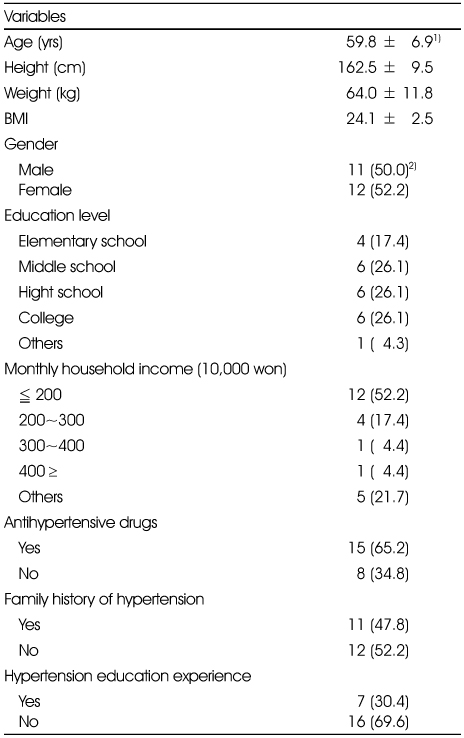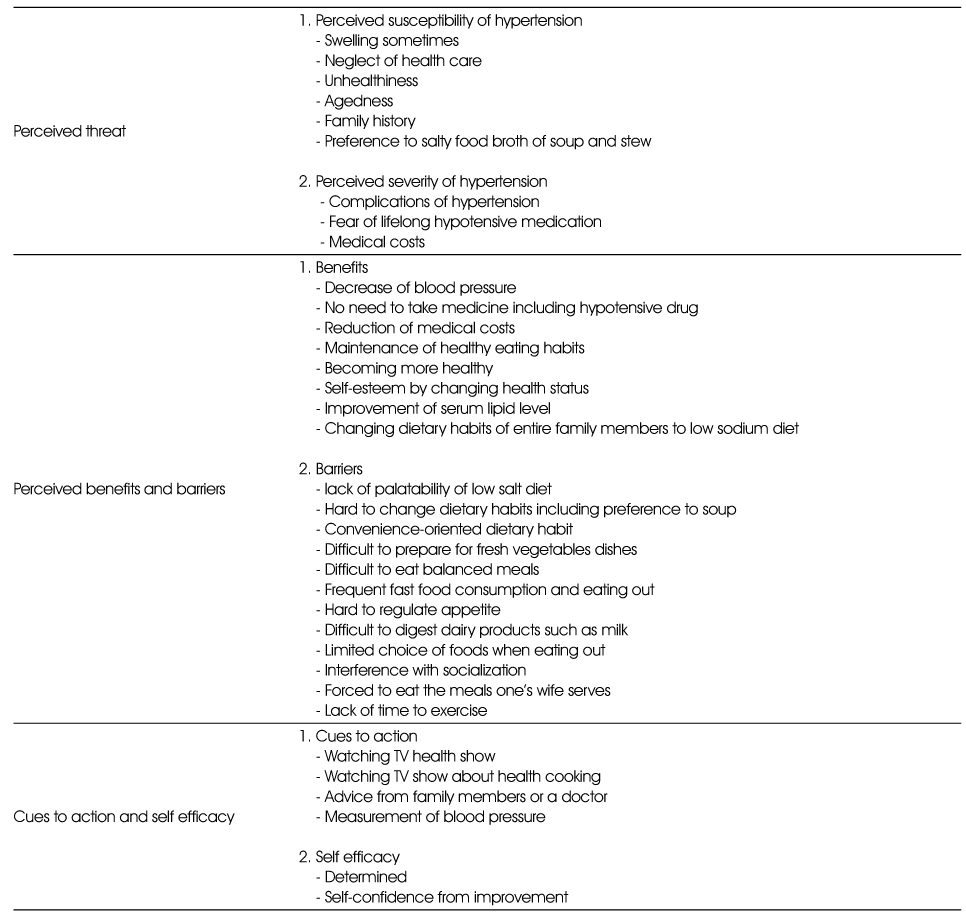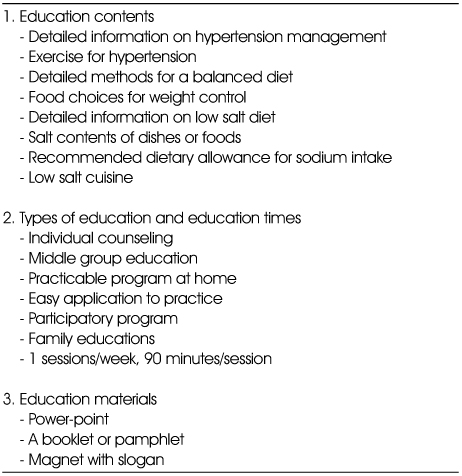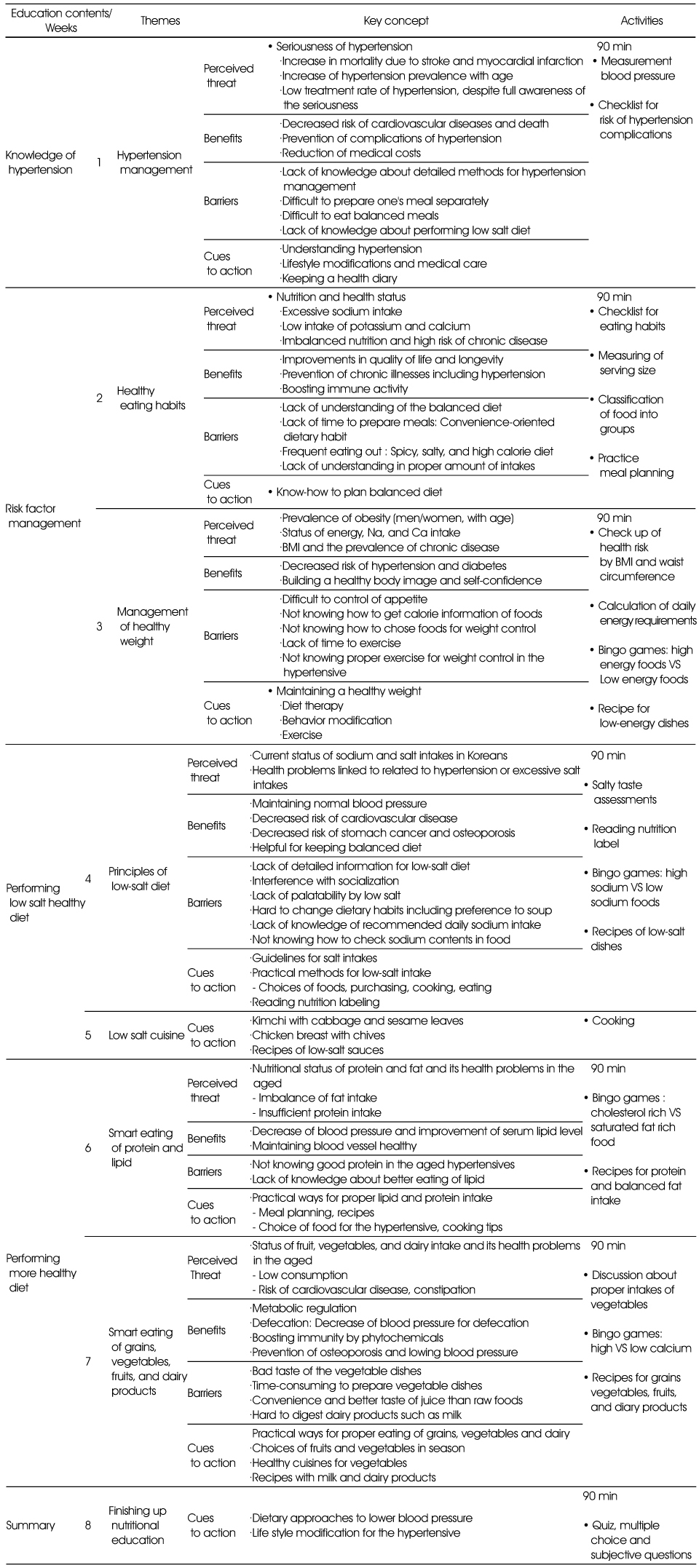References
1. Abood DA, Black DR, Diane F. Nutrition education worksite intervention for university staff: application of the health belief model. J Nutr Educ Behav 2003. 35(5)260–267.
2. American Heart Association. Blood pressure risk calculator 2012. cited 2012 May 1. Available from
http://www.heart.org.
3. Catholic University of Korea & Management Center for Health promotion. Integrated health promotion service in community health center 2010. cited 2011 March 1. Available from
http://research.hp.go.kr.
4. Choi-Kwon S, Kim JS. Lifestyle factors and risk of stroke in Seoul, South Korea. J Stroke Cerebrovasc Dis 1998. 7(6)414–420.
5. Cho SN, Lee HJ, Joo YJ, Kim NY. Qualitative research design & practice 2011. Seoul: Green; 95–116.
6. Ellis J, Johnson MA, Fischer JF, Hargrove JL. Nutrition and health education intervention for whole grain foods in the georgia older Americans nutrition program. J Nutr Elder 2005. 24(3)67–83.
7. Glanz K, Rimer BK, Viswanath K. Health behavior and health education: theory, research and practice 2008. SF: Joseey-Bass; 45–62.
8. Health Insurance Policy Institute. Analysis of health insurance increasing factor 2010. cited 2011 March 1. Available from
http://www.nhic.or.kr/.
9. He FJ, Macgregor GA. Reducing population salt intake worldwide: from evidence to implementation. Prog Cardiovasc Dis 2010. 52(5)363–382.
10. Huh GY. Analysis of the risk factors related to hypertension and development of FFQ and nutrition education program 2003. The Catholic University of Korea; 120–148.
Dissertation.
11. Inui TS, Yourtee EL, Williamson JW. Improved outcomes inhypertension after physician tutorials. Ann Intern Med 1976. 84(6)646–651.
12. Jo HS, Kim CB, Lee HW, Jeong HJ. A meta-analysis of health related behavior study based on health belief model in Korean. Korean J Health Psychol 2004. 9(1)69–84.
13. Jung EJ. The effect of salt reduction education program combined with DASH on blood pressure and salt intake of adults 2008. Catholic University of Korea; 9–20.
MS thesis.
14. Korea Food & Drug Administration. Reduce sugar, natrium and fat intakes 2012. cited 2011 May 1. Available from
http://www.foodnara.go.kr.
15. Kim MK, Han JI, Chung YJ. Dietary behavior related to salty food intake of adults living in a rural area according to saline sensitivity. Korean J Nutr 2011. 44(6)537–550.
16. Lee KJ, Park SH, Park KO. Health counseling 2008. Seoul: Ewha Womans University Press; 115–122.
17. Ministry of Health & Welfare, Korea Centers for Disease Control & Prevention. Korea National Health & Nutrition Examination Survey 2011. cited 2011 March 1. Available from
http://knhanes.cdc.go.kr.
18. Moon EH, Kim KY. Evaluation of nutrition education for hypertension patients age 50 years and over. Korean J Community Nutr 2011. 16(1)62–74.
20. Nelson EC, Stason WB, Neutra RR, Solomon HS, Mcardle PJ. Impact of patient perceptions on compliance with treatment for hypertension. Med Care 1978. 16(11)893–906.
21. Park YS, Son SM, Lim WJ, Kim SB, Chung YS. Comparison of dietary behaviors related to sodium intake by gender and age. Korean J Community Nutr 2008. 13(1)1–12.
22. Rosenstock IM. Historical origins of the health belief model. Health Educ Monogr 1974. 2328–335.
24. Silverman D. Doing qualitative research 2010. third editionth ed. London: SAGE; 131–132.
192–199.
25. Son SM, Huh GY. Dietary risk factor, hypertension, urinary sodium. Korean J Community Nutr 2006. 11(5)661–672.
26. Statistics Korea. Annual report on the cause of death statistics 2010. cited 2011 March 1. Available from
http://kostat.go.kr.
27. Sullivan KA, White KM, Young RM, Chang A, Roos C, Scott C. Predictors of intention to reduce stroke risk among people at risk of stroke: an application of an extended health belief model. Rehabil Psychol 2008. 53(4)505–512.
28. The Canadian Hypertension Education Program. Hypertension Canada 2012. cited 2011 March 1. Available from
http://www.hypertension.ca.
29. Yim KS, Min YH, Lee TY. Evaluations of the Elderly Nutrition Improvement Program in the community health center: Effects of nutrition counseling and education program on elderly dietary behavior. J Korean Diet Assoc 1997. 3(2)197–210.
30. Yim KS. The Effects of a nutrition education program for hypertensive female elderly at the public health center. Korean J Community Nutr 2008. 13(5)640–652.
31. Yoon HS, Lee H, Lee S. Factors associated with the use of health promotion program -Seoul community health center-. Health Soc Welf Rev 2008. 28(2)157–184.
32. Glanz K, Rimer BK, Lewis FM. Yoo T, Yoo HR. Behavior and health education: Theory, research, and practice 2009. 3rd editionth ed. Seoul: Koonja; 43–69.
